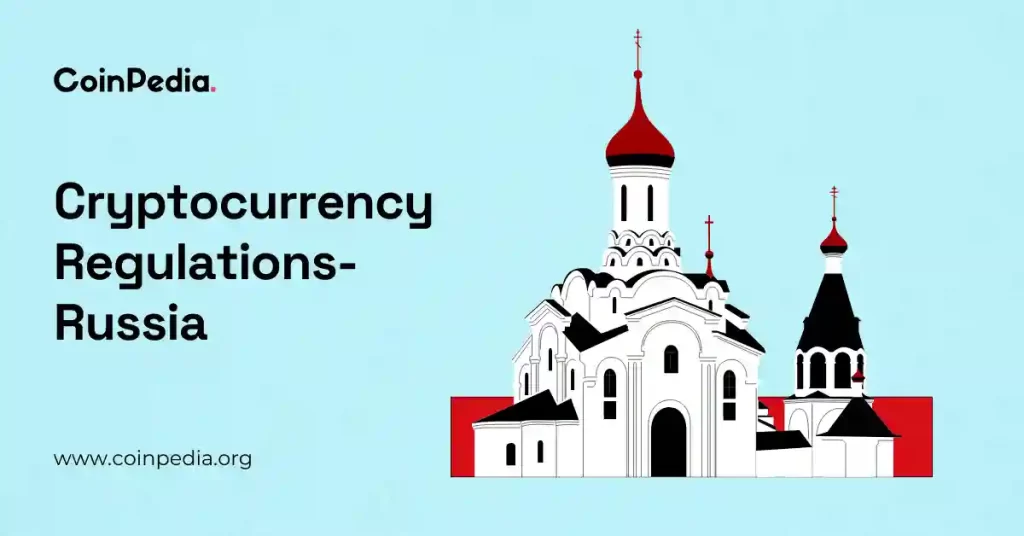Crypto Regulations in Russia 2025
0
0

The post Crypto Regulations in Russia 2025 appeared first on Coinpedia Fintech News
Russia emerged as a major crypto hub in Europe after President Vladimir Putin signed a law in July 2020 legalizing digital financial asset (DFA) transactions. Since then, the country has made significant progress in the digital asset space.
Now, in 2025, Russia is strengthening its position further by introducing stricter laws aimed at building a comprehensive regulatory framework. These new rules are designed to balance innovation with security, supporting the growth of a robust crypto ecosystem.
Crypto regulations in Russia
May 26, 2025– Ban on Tether in Russia
- Russia’s new central bank regulations could ban Tether (USDT), targeting coins to “hostile issuers” or at risk of being blocked or frozen.
- Only stablecoins not linked to ‘hostile issuers’ or prone to blocking will be allowed.
May 19, 2025- Draft Bill: Crypto asset as property
- Under this bill, crypto is subject to seizure in criminal proceedings.
- The Deputy of Justice clarifies, this bill aims to serve the purpose of arrest and subsequent confiscation.
Mar 12, 2025- Three-year framework for crypto
- Under this regulation, the Bank of Russia allowed only wealthy investors in the country to trade in crypto.
- Russian investors with at least 100 million rubles or those who exceeded 50 million rubles in 2024 are allowed for crypto investments.
- It also plans on banning crypto by not considering it a means of payment. Only allowing the “super qualified investors.”
March 2025– EU sanctions crypto exchange Garantex
- This sanction in Russia arrived after an ICJ investigation linked Garantex to entities in the Russian government and criminal organizations.
- Guarantex allowed people to use cryptocurrencies to make foreign transfers; however, after sanctions, all operations were ceased.
January 2025– Strengthening crypto regulations
- The Bank of Russia introduces new rules to strengthen the aspect of foreign exchange and digital rights.
- These digital rights include electronic records such as cryptocurrencies, tokenized securities, and digital tokens.
- This approach aims to integrate digital assets into the traditional financial system while ensuring stability.
What is the government of Russia saying about crypto?
The cryptocurrencies in Russia are primarily overseen by the Bank of Russia, which is working on tightening the crypto rules in 2025. It modified some existing rules while introducing a few new ones to facilitate security and stability.
On May 28, the Bank of Russia introduced a new crypto law while stating–
“Financial institutions may offer qualified investors financial derivatives, securities, and digital financial assets whose yields are linked to cryptocurrency prices.”
Additionally, the Russian government also legalized crypto mining and introduced a new tax legislation for crypto miners. Initially, the bill was introduced in November 2024 and took effect in 2025. However, crypto mining remains banned in some places, such as the North Caucasus and the occupied territories of Ukraine.
Crypto tax in Russia 2025
The new cryptocurrency tax law came into effect from 1st January 2025, as the parliament of Russia passed a federal bill on November 27th, 2024.
| Category | Crypto Tax | Tax rate |
| Individuals | Income tax on crypto sales | 13% on 2.4 million & 15% on over 2.4 million |
| Mining (individuals) | Income tax on crypto | 13% on 2.4 million & 15% on over 2.4 million |
| Mining (corporate) | No VAT, only corporate tax applied | 25% corporate tax |
| Foreign entities | 2-stage taxation- on receipt and on crypto sale | 20%-25% corporate tax |
| Individuals and corporate | Tax exemption if unreported | Earning below 50,000 rubles |
| Mining | VAT exemption | Sale cuts cost by 18% on legal platforms |
| Reporting | FTS on Form 3-NDFL or Corporate forms | April 30 each year |
| Mining reporting | Monthly report | By the 20th online |
| Penalty | Missing deadline | 5,000 to 40,000 rubles + 20% yearly interest |
| Penalty | Hidden crypto | 60% tax or jail |
Crypto license in Russia
- Registration: Crypto platforms are required to register with the Bank of Russia and comply with anti-money laundering and counter terrorism financing to operate legally in the region.
- VASP license: After applying with local financial institutions, a Virtual Asset Service Provider (VASP) license is provided to them by the Bank of Russia. After these procedures, the crypto companies and platforms are allowed to engage in crypto activities, including trading, mining, exchange, or custody.
- DFA & ELR: Additionally, platforms are required to adhere to foreign digital financial assets (DFA) and experimental legal regime (ELR) to operate crypto trading.
Crypto adoption in Russia 2025
- User penetration: The Current penetration rate is approximately 29.06%, which is expected to increase by 30.88% by 2026. The number of crypto users is anticipated to reach 44.29 million in 2026.
- Crypto market revenue: In 2025, the crypto market revenue is expected to reach US$2.3 billion, which is anticipated to grow annually at the rate of 68.45%, projecting a total amount of US$3.9 billion by 2026. The current data of crypto revenue represents that the average revenue per user in 2025 is estimated to be US$55.2.
- Crypto holding: Not publicly disclosed yet; policies focusing on refining crypto laws to minimize crime and crypto fraud.
Conclusion
Russia has revised its existing crypto laws and introduced stricter regulations to combat crypto-related crimes. For instance, recent changes to crypto tax rules now include prison sentences for non-compliance.
These tougher penalties are aimed at deterring fraudsters and protecting users from scams. Overall, the new measures have made Russia’s regulatory framework more secure, helping to expand the crypto landscape with greater safety and accountability.
Never Miss a Beat in the Crypto World!
Stay ahead with breaking news, expert analysis, and real-time updates on the latest trends in Bitcoin, altcoins, DeFi, NFTs, and more.
FAQs
Yes, Russia legalized digital financial asset (DFA) transactions in July 2020. In 2025, it’s strengthening its framework with stricter laws to balance innovation and security.
Russia’s new central bank regulations from May 26, 2025, could ban Tether (USDT) for domestic use, targeting stablecoins linked to “hostile issuers” or those at risk of being blocked.
For individuals in Russia, income from crypto sales and mining is taxed at 13% for earnings up to 2.4 million rubles, and 15% for income exceeding that amount, starting January 1, 2025.
Corporate crypto mining profits in Russia face a 25% corporate tax rate from 2025, with no VAT applied. Foreign entities have a 2-stage taxation (20-25% corporate tax) on receipt and sale.
The Bank of Russia primarily oversees crypto regulations in the country. It is responsible for tightening rules, issuing licenses (VASP), and integrating digital assets into the financial system.
0
0
 Manage all your crypto, NFT and DeFi from one place
Manage all your crypto, NFT and DeFi from one placeSecurely connect the portfolio you’re using to start.




